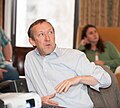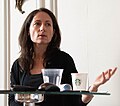| Year | | Prize winner | Country | Work |
|---|
| 1981 | | Manfred G. Schmidt |  Germany Germany | Wohlfahrtsstaatliche Politik unter bürgerlichen und sozialdemokratischen Regierungen: Ein internationaler Vergleich |
| 1983 | | Jens Alber |  Germany Germany | Vom Armenhaus zum Wohlfahrtsstaat: Analysen zur Entwicklung der Sozialversicherung in Westeuropa (From the Poor House to the Welfare State: Analysis of the Development of Social Insurance in Western Europe),
"Einige Grundlagen und Begleiterscheinungen der Entwicklung der Sozialausgaben in Westeuropa, 1949-1977" ("Some Causes and Consequences of Social Security Expenditure Development in Western Europe, 1949-1977") |
| 1986 | | Louis M. Imbeau [ fr ] |  Canada Canada | Donor Aid: The Determinants of Development Allocations to Third World Countries |
| 1988 |  | Charles C. Ragin |  United States United States | The Comparative Method: Moving beyond Qualitative and Quantitative Strategies |
| 1990 |  | Stefano Bartolini |  Italy Italy | Identity, Competition and Electoral Availability: The Stabilisation of European Electorates 1885-1985 |
| Peter Mair |  Ireland Ireland
 Italy Italy
 Netherlands Netherlands |
| 1992 | | Kaare Strøm |  Norway Norway | Minority Government and Majority Rule |
| 1996 | | Kees van Kersbergen [ de ] |  Netherlands Netherlands | Social Capitalism: A Study of Christian Democracy and the Welfare State |
| 1998 | | Robert Rohrschneider [ de ] |  Germany Germany
 United States United States | Learning Democracy: Democratic and Economic Values in Unified Germany |
| 2000 | | Eva Anduiza Perea [ de ] |  Spain Spain | Individual and Systemic Determinants of Electoral Abstention in Western Europe |
| 2002 |  | Patrick Le Galès |  France France | European Cities: Social Conflicts and Governance |
| 2004 |  | Daniele Caramani |  Italy Italy
 Switzerland Switzerland | The Nationalization of Politics: The Formation of National Electorates and Party Systems in Western Europe |
| 2006 | | Milada Anna Vachudova [ de ] |  United States United States | Europe Undivided: Democracy, Leverage, and Integration after Communism |
| 2008 |  | Cas Mudde |  Belgium Belgium
 Netherlands Netherlands | Populist Radical Right Parties in Europe |
| 2009 |  | Robert E. Goodin |  Australia Australia
 United States United States | Discretionary Time: A New Measure of Freedom |
 | James Mahmud Rice |  Australia Australia
 United States United States |
 | Antti Parpo |  Finland Finland |
 | Lina Eriksson |  Australia Australia
 Sweden Sweden |
| 2010 |  | Beth A. Simmons |  United States United States | Mobilizing for Human Rights: International Law in Domestic Politics |
| 2011 | | James W. McGuire |  United States United States | Wealth, Health, and Democracy in East Asia and Latin America |
| 2012 | | Pepper D. Culpepper |  Italy Italy
 United States United States | Quiet Politics and Business Power: Corporate Control in Europe and Japan |
| 2013 | | Dorothee Bohle |  Germany Germany
 Hungary Hungary | Capitalist Diversity on Europe's Periphery |
| Béla Greskovits [ de ] |  Hungary Hungary |
| 2014 |  | Christian Welzel |  Germany Germany | Freedom Rising: Human Empowerment and the Quest for Emancipation |
| 2015 | | Marius R. Busemeyer [ de ] |  Germany Germany | Skills and Inequality: Partisan Politics and the Political Economy of Education Reforms in Western Welfare States |
| 2016 | | Stanislav Markus |  United States United States | Property, Predation, and Protection: Piranha Capitalism in Russia and Ukraine |
| 2017 | | Abel Escribà-Folch |  Spain Spain | Foreign Pressure and the Politics of Autocratic Survival |
| Joseph Wright |  United States United States |
| 2018 |  | Rafaela M. Dancygier |  United States United States | Dilemmas of Inclusion: Muslims in European Politics |
| 2019 | | Andreas Wimmer |  Switzerland Switzerland
 United States United States | Nation Building: Why Some Countries Come Together while Others Fall Apart |
| 2020 | | Jeffrey M. Chwieroth |  United Kingdom United Kingdom
 United States United States | The Wealth Effect: How the Great Expectations of the Middle Class Have Changed the Politics of Banking Crises |
| Andrew Walter |  Australia Australia |
| 2021 | | Ran Hirschl |  Canada Canada | City, State: Constitutionalism and the Megacity |
| 2022 |  | Vineeta Yadav |  India India
 United States United States | Religious Parties and the Politics of Civil Liberties |
| 2023 |  | Elisabeth Anderson |  Germany Germany
 United Arab Emirates United Arab Emirates
 United States United States | Agents of Reform: Child Labor and the Origins of the Welfare State |
| 2024 |  | Anu Bradford |  Finland Finland
 United States United States | Digital Empires: The Global Battle to Regulate Technology |















